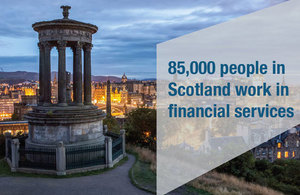EU membership crucial for Scotland’s thriving financial services industry, says UK City Minister (Archived)
Visiting Edinburgh, Harriett Baldwin will set out how a vote to remain in the EU will protect jobs, promote economic growth and ensure that Scottish businesses continue to flourish.

85,000 people in Scotland work in financial services
Referring specifically to Scotland’s historic financial services sector, the Economic Secretary, Harriett Baldwin, will set out how a vote to remain in the EU will protect jobs, promote economic growth and ensure that Scottish businesses continue to flourish.
As part of the EU the financial services sector in Scotland has gone from strength to strength. After London, Scotland boasts the UK’s next two largest international financial hubs in Edinburgh and Glasgow. The sector contribute more than 7% of Scotland’s GDP and employs around 85,000 people, with a further 70,000 working in associated professional services.
It has a history in banking and asset management, with global institutions such as the Royal Bank of Scotland, Aberdeen Asset Management and Standard Life choosing Scotland as the destination for their headquarters. Around half the world’s largest financial firms have chosen to base their European headquarters in the UK. Firms based in the UK can easily trade across the EU without the cost and complexity that firms outside the EU face. In 2014, the amount of investment in the UK’s financial services sector, by companies based across the world reached £280 billion - 17% of this was from the EU.
Being a member of the EU has meant that the UK has full access to the single market- a market of over 500 million customers and an economy over five times bigger than the UK’s.
In financial services access to the single market helps the UK sector to export over £20 billion of financial services to the EU, around 33% of the UK’s total financial and insurance and pensions services exports.
New Treasury analysis shows 285,000 jobs across the UK are linked to financial services exports to the EU. 100,000 financial services jobs are directly linked to these exports, and a further 185,000 jobs are linked to the indirect demand generated in the wider economy as a result of financial services exports to the EU.
Leaving the EU would put tens of thousands of these jobs at risk.
As part of the EU and as part of a modern economy, business in Scotland has been thriving. Since 2010, 55,400 new businesses have started up in Scotland and have been able to access the finance they need to grow. There is no alternative to EU membership that could retain the UK’s crucial access to the Single Market for financial services without having to accept EU rules that the UK could not influence. As one example of the importance of retaining our strong influence over EU rules, the UK has provided support for an EU initiative that will make it easier for smaller businesses in the EU to access finance.
Today, on a tour around Edinburgh, the Economic secretary will talk to entrepreneurs and financial services business leaders about how remaining in the EU creates the perfect economic conditions for businesses to thrive. She will urge businesses to tread the path of certainty. To take the route that leads to future growth and prosperity in Scotland, rather than taking the dangerous leap into the dark that will damage the conditions for the next 55,000 businesses looking to succeed.
Economic Secretary to the Treasury, Harriett Baldwin said:
Membership of the EU and the enormous benefits this provides means that that the financial services sector in Scotland is thriving.
It directly employs around 85,000 people, with a further 70,000 working in associated professional services, and contributes more than 7% of Scotland’s GDP- showing the crucial role the financial services sector plays in the Scottish economic landscape.
As part of the EU, as part of the Single Market and as part of a modern economy, business in Scotland has been booming. Since 2010, 55,400 new businesses have started up in Scotland and have been able to access the finance they need to grow.
It is clear that for Scotland’s future prosperity that there is no credible or, in fact, more desirable alternative to EU membership.
Let’s not put all of this at risk on the 23rd of June.
While in Edinburgh the Economic Secretary will visit Entrepreneurial Spark, the world’s largest free business accelerator for early stage and growing ventures. She will tour the facilities and meet some of the start-ups to hear their views about the importance for their businesses of remaining in the EU.
The Economic Secretary will then attend a roundtable hosted by Scottish Financial Enterprise, the representative body for Scotland’s financial services industry. This will be attended by industry leaders and what the EU referendum means for the financial services sector in Scotland will be the main topic of discussion. Given the importance of remaining in the EU for entrepreneurs in Scotland, the day will finish with a visit to CodeBase, the largest technology incubator in the UK and one of the fastest growing in Europe.
The Economic Secretary’s trip to Edinburgh is part of a wider series of regional visits she is undertaking across the UK, including to Belfast, Bangor and Chester, to showcase how the success of the UK’s financial services regional hubs is dependent on the UK remaining in the EU.